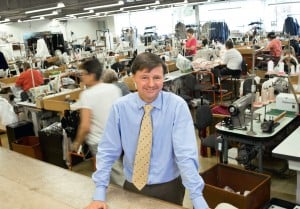Derbyshire fashion house David Nieper, one of the UK’s leading fashion manufacturers today welcomed the formal trigger of Article 50 and the long awaited turning of the key in the ignition of British business.
The fashion house which celebrated 55 years in business last year, exports one third of products to France, Germany and Holland and has been trading within Europe’s markets since long before the emergence of EU administration.
Christopher Nieper of the Derbyshire fashion house commented:
“Article 50 is a shot of adrenalin for British manufacturing and a catalyst to export for our great trading nation. British design and British made products are revered the world over, so let’s see this as an opportunity and not a hazard.
We must cultivate British skills, create British jobs, take advantage of the weak GBP and bring supply chains and prosperity back to our shores. British manufacturing is a shadow of its former self and Article 50 provides the driving force to put us back on the world stage.”
The trend of manufacturing overseas which started in the seventies and has almost decimated the fashion production industry in the UK. [1]In 1977 over 900,000 people were employed in fashion manufacturing in the UK, this figure has fallen to just 34,000, a 96 percent reduction.
More broadly within the manufacturing industry, overseas production has resulted in a downturn in UK manufacturing across all industries, a rise unemployment, the affliction of an unskilled workforce and a downturn in export. This downward spiral has contributed to the UK’s substantial trade deficit, an increase in borrowing and national debt.
The Government’s new ten pillar modern industrial strategy is a useful start on the road to recovery, it addresses the skills shortage and puts onus on both education and the business world to work more closely together to ensure the market is up to the challenge.
Once the strategy comes into fruition a virtuous trade circle will be allowed to develop – more manufacturing means more jobs, more skills, more exports and as a consequence less trade deficit, less borrowing and less debt.
Since the Brexit vote, productivity at the Derbyshire fashion house has increased, boosted by the lower value of GBP. Sales in the last quarter of 2016 were up by 19% in UK and 16% in the EU.
Christopher continued:
“The opportunity for manufacturers is very real and so too is the challenge, the new industrial strategy is a much more sustainable model. At David Nieper we have already taken the first steps and committed to increasing our own skills to meet demand by increasing the size of our sewing school by 150% by end of 2019.
We have no doubt that Article 50 will help the wheels of commerce turn in the right direction for us all, and that developing local skills is the key to future success for the manufacturing industry and prosperity in a post Brexit world.”
* https://fashionunited.uk/uk-fashion-industry-statistics
-ENDS-
For further information contact
David Nieper, Press Office
Lauraine Jordan
07904 257687




